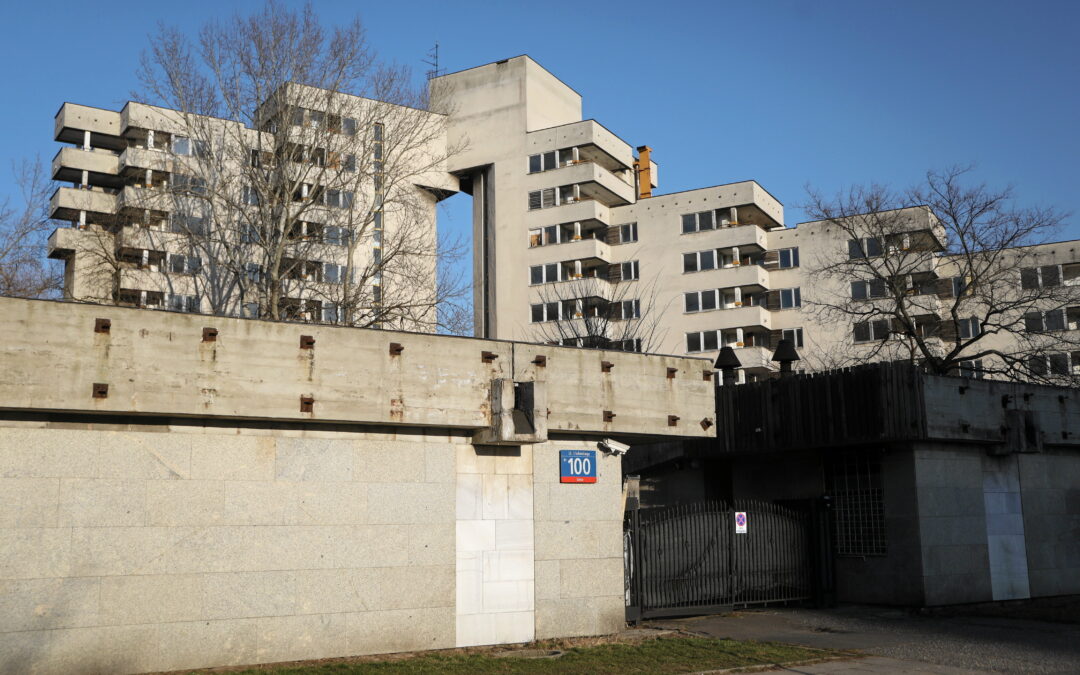The mayor of Warsaw has announced that he will house Ukrainian families in a communist-era apartment building, ownership of which is claimed by Russia. This evening, Poland’s foreign ministry also declared that it was seeking to take control of the site and another in the city claimed by Russia.
The apartments at 100 Sobieski Street in Warsaw were built in the 1970s under an agreement with the USSR when Poland was part of the Soviet Bloc. They were used as a luxury hotel and residence for Soviet diplomats, reports TVN24.
The building was abandoned in the 1990s after the fall of communism and has lain empty since, though rumours that it was still used by Russian intelligence led locals to name the site “Spyville” (Szpiegowo). A group of urban explorers who gained entry found a Russian newspaper from 2005 there, reports Nasze Miasto.
In the meantime, the site became the subject of a legal dispute, with Russia still claiming ownership but the Polish side rejecting these claims. In 2016, the district court in Warsaw ordered Russia to hand over the building and pay Poland 7.8 million zloty in compensation for unlawful occupation.
Russia is yet to comply with the ruling, arguing that the site is a diplomatic post. But this afternoon Warsaw’s mayor, Rafał Trzaskowski, announced that “in view of the Russian aggression against Ukraine, I have decided to arrange apartments [at 100 Sobieski Street] for the needs of Ukrainian families with children.
Świetne miejsce dla rodzin Ukrainców uciekających z zaatakowanej przez Rosję Ukrainy.
Decyzją @trzaskowski budynki w Warszawie odebrane Rosji!
Brawo!#StandWithUkraine pic.twitter.com/0RYLvFJT5Y
— Katarzyna Lubnauer (@KLubnauer) March 1, 2022
In a statement this evening, the Polish foreign ministry, which had previously been in talks with Russia over returning the building, announced that it had “applied to competent public administration bodies recommending enforcement proceedings regarding two properties…illegally owned by the Russian Federation”.
One is 100 Sobieski Street and the other a building at 45 Kielecka Street in Warsaw. The ministry notes that both properties are “subject to final and binding judgments by Polish courts ordering their release to the rightful owner, the state treasury”.
Komunikat MSZ dot. wystąpienia do właściwych organów o wszczęcie postępowań egzekucyjnych w sprawie nieruchomości znajdujących się w bezprawnym posiadaniu Federacji Rosyjskiej
➡️https://t.co/pg96BoguYV pic.twitter.com/Xm0WaNVfbb
— Ministerstwo Spraw Zagranicznych RP 🇵🇱 (@MSZ_RP) March 1, 2022
Legal news and analysis website Bezprawnik notes that the sites are just two out of 21 that have remained under Russian control in Warsaw, with many being rented out commercially despite Moscow claiming they are diplomatic posts.
In a statement today, Warsaw city hall said that it had “applied to a bailiff to initiate enforcement proceedings regarding the building at Sobieski Street…[and] will also demand the return of further real estate”.
The decision was welcomed by Natalia Panchenko from Euromaidan-Warsaw, who told Gazeta Wyborcza that it was an important “symbolic gesture” to house Ukrainian refugees there. She said that the Ukrainian community would launch a fundraising campaign to pay for renovation.
Over 90% of Poles support accepting Ukrainian refugees, while 64% say they are personally willing to help them, according to two new polls
Recent days have seen a flood of support from Polish society for the hundreds of thousands of people fleeing Ukraine https://t.co/xe70yzxPuP
— Notes from Poland 🇵🇱 (@notesfrompoland) March 1, 2022
In common with towns and cities all around Poland, Warsaw has been offering accommodation and other support to refugees who have fled Ukraine since Russia’s invasion last Thursday.
The city’s spokeswoman, Monika Beuth-Lutyk, said today that authorities have secured 2,200 places for refugees to live. But she warned that “there is a physical shortage of places [and] we are approaching the end of the number of refugees that Warsaw can accept”, reports the Polish Press Agency (PAP).
"In Przemyśl, a [Polish] town that is the first stopping point for many refugees, there is a visibly large number of Africans and people from the Middle East…
An Indian student told @AP that, once [they were] in Poland, the Poles did everything to help" https://t.co/ycy6eAIg0X
— Notes from Poland 🇵🇱 (@notesfrompoland) March 1, 2022

Daniel Tilles is editor-in-chief of Notes from Poland. He has written on Polish affairs for a wide range of publications, including Foreign Policy, POLITICO Europe, EUobserver and Dziennik Gazeta Prawna.




















